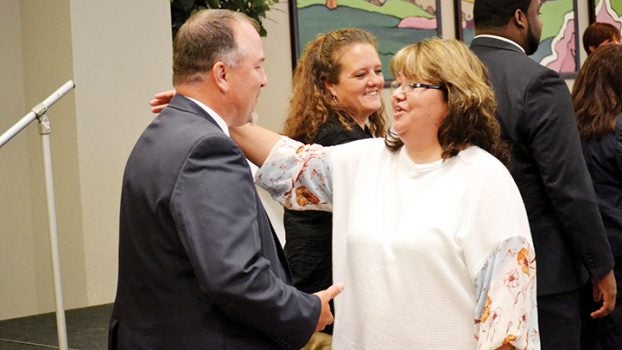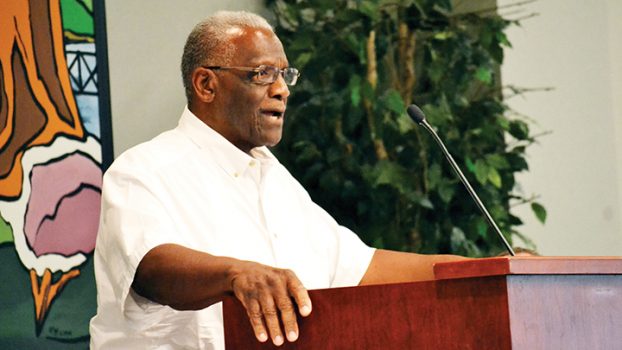A second chance — 20 graduates receive certificates at 14th Circuit Drug Court ceremonies
Published 7:37 pm Tuesday, May 22, 2018
A Brookhaven woman is grateful for the best decision she didn’t make.
Candi Raborn didn’t choose to enter drug court freely. But it was a chance to stay out of jail and get her record expunged. It took five long, hard years of following the rules, staying clean and sober, and learning what truly was important in life — her family.
Raborn and 19 other graduates received certificates of completion during the 14th Circuit Drug Court graduation Monday at Southwest Mississippi Community College in Summit.
“I’m grateful for this program,” she said. “It not only changed my life, it saved it. I probably wouldn’t be alive today if it wasn’t for it.”
In 2004, Raborn suffered from medical problems and a doctor prescribed pain pills. At one point she was taking up to 20 Lortab a day. She even forged a prescription to get drugs, but doesn’t remember doing it. That got her arrested.
“It’s like I went to sleep one night and woke up 10 years later in a jail cell,” she said.
Raborn became estranged from her family. She nearly lost her husband. Her mother died.
Her addiction to opioids was a disease, she said.
“A disease that took my family, my husband, my career, my dignity, my self-respect but most importantly, some very precious time,” she said.
But Raborn is grateful for what she accomplished through her time in drug court. She is re-enrolling in college and plans to finish her nursing degree that she started years ago.
She and her husband are still together after 19 years and her children and grandchildren are an important part of her life.
“Life is a lot better,” she said. “I was consuming such large amounts of pain meds on a daily basis, it’s a miracle I’m alive.”
Rep. Angela Cockerham of Magnolia was the guest speaker at the ceremony, held in the Horace Holmes Student Union Hall at Southwest. Circuit Judges Michael Taylor and David Strong presided.
The 14th Circuit Drug Court currently has about 240 participants from Lincoln, Pike and Walthall counties. All must spend at least three years in the program and meet all of its requirements before being able to graduate. Raborn was one of 20 who graduated Monday.
Taylor presented Doc Harrison, a member of the Drug Court Advisory Board, with a certificate of recognition after the diplomas were awarded.
“His entire life has been about second chances,” Taylor said. “Reaching out to people and helping people in need of a second chance. He’s who I want to be when I grow up.”
Rev. Heath Ferguson, director of pastoral care and faith relations at Mississippi Baptist Health Systems, provided the benediction. Ferguson graduated from the14th Circuit Drug Court in 2010.
Drug courts seek to rehabilitate drug-using offenders through drug treatment and intense supervision with frequent court appearances and random drug testing. Drug courts offer the incentive of a chance to remain out of jail and be employed and penalty of a prison sentence if participants fail to remain drug-free and in compliance with all program requirements.
Mississippi currently has 42 drug courts. There are 22 adult felony programs, with a drug court operating in every Circuit Court district in the state. There are 14 juvenile programs, three family courts and three misdemeanor programs. More than 3,600 people are enrolled in drug courts statewide.
The graduation was attended by U.S. District Judge Keith Starrett, who founded the state’s first felony adult drug court in 1999 while he served as state circuit judge in Lincoln, Pike and Walthall counties.
Strong said drug court has made a huge difference in Lincoln County and the surrounding areas.
“It’s hard to imagine what life would be like for many of you and many of us if we did not have drug court,” Strong said. “We know what life is like now and we know that there are better opportunities and life is better than it otherwise could have or would have been. Drug court at times has been called a second chance, but for a couple of you, more than that it’s a second chance, sometimes a third chance, a fourth chance or a fifth chance, but it is a chance.”
Drug addicts who participate have strict rules to follow to graduate, said John Douglas, coordinator for the 14th Circuit Court District. They have to completely pay restitution and complete and pay for their drug treatment. They are drug tested a minimum average of twice a week, sometimes more, he said. They have to be clean and sober, and cannot test positive or have any discipline problems for a period of a year to complete each of the four phases of drug court.
Addicts convicted of violent crimes are not eligible for drug court.
Those who graduate the program have their records expunged.
“Once they get clean and sober and get their lives back going in a direction, if they came out with a criminal record, it would hinder them from moving on. And that’s what this whole thing is about, trying to get them to move on, do better and live better,” Douglas said.






